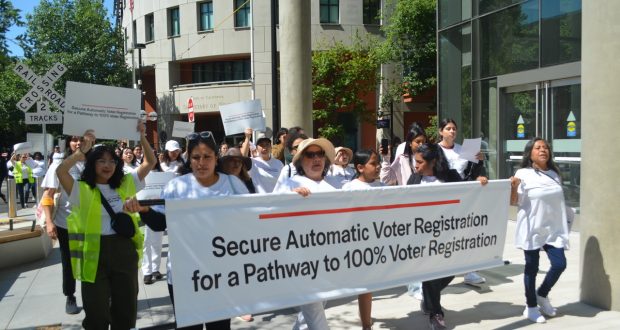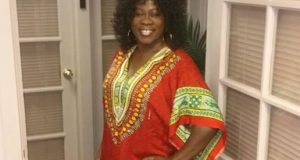By Antonio Ray Harvey | California Black Media
Last week, hundreds of community leaders, advocates, and organizers representing labor, faith-based, Black, AAPI, Latinos, women and youth rally and march were held at the State Capitol. They were supporting Senate Bill (SB) 846, which aims to increase election turnout and remove barriers to voter registration for millions of Californians.
The California Grassroots Democracy Coalition, which is the largest voting rights coalition in California, has launched a campaign to enfranchise 4.7 million unregistered voters through SB 846. This bill, also known as the Motor Voter bill, was authored by state Senators Caroline Menjivar (D-Chino) and Monique Limón (D-Santa Barbara).
The coalition, which represents millions of Californians, has embarked on a multi-year campaign to expand the electorate to better reflect the state’s diversity. SB 846 is co-sponsored by three members of the California Black Legislative Caucus (CLBC) — Assemblymembers Tina McKinnor (D-Inglewood), Chris Holden (D-Pasadena), and Mike Gipson (D-Carson).
“For decades, grassroots organizations like ours have worked year-round, mobilizing voters, organizing immigrant communities, providing legal services, running advocacy campaigns, and building multi-racial, multi-issue coalitions,” said Stanette Dixon, volunteer coordinator from Congregations Organized for Prophetic Engagement. “We are coming together to advance a new vision for California’s democracy and dismantle racist barriers to civic participation that marginalize BIPOC, naturalized citizens, young, low-income, and low English proficiency voters.”
SB 846 is being reviewed in the Senate Appropriations Committee. The bill requires the Department of Motor Vehicles to transmit specified information to Secretary of State Shirley Weber for each person submitting a driver’s license application. To be eligible for voter registration or preregistration, these individuals must be United States citizens and of an eligible age.
Several states, including Alaska, Massachusetts, Oregon, Colorado, Delaware and the District of Columbia, have already passed similar legislation with overwhelmingly positive results. Members of the coalition and other supporters marched from the state capitol and circled the Secretary of State building twice at 10th and O streets in downtown Sacramento to rally support for the legislation.
SB 846 provides a path to 100% voter registration, supporters say.
“California is no stranger to making election improvements, from creating the first version of automatic voter registration, to making it possible for all registered voters to vote by mail. Now, we have the opportunity to take the next step in modernizing California’s elections,” Limón said in a statement. “SB 846 will broaden access to the ballot box for all eligible voters.”
Data shows that due to a lack of voter registration among traditionally hard-to-reach communities, California’s current voter population is unrepresentative of its demographic, Limón and Menjivar explain.
According to the Public Policy Institute of California (PPIC), 82% of California’s adults are eligible to vote, but only 64% are registered. As a result, younger, lower income, less educated and state residents who are renters are underrepresented during elections.
Leveraging its voter engagement expertise with communities traditionally ignored by mainstream political campaigns, the California Grassroots Democracy Coalition (CGDC) says it promotes legislation that expands the electorate, builds up civic education, voter registration, and turnout in underrepresented communities, according to the group’s website.
CGDC comprises 140-plus grassroots organizations that are committed to helping California’s most vulnerable communities become empowered through pro-democracy reforms. Organizations in the network have a range of priorities, including, criminal justice reform, immigrant rights, language access, low-income communities, environmental justice, religious rights, labor unions, etc.
Julius Thibodeaux, Executive Director for Movement 4 Life, spoke about his experience as a person who was formerly incarcerated and how it affected his access to voting. He also discussed the importance of investing in the development, health and wellbeing of youth in cities.
“In 2020, California voters restored voting rights for more than 50,000 people who are no longer incarcerated. But that’s only the first step,” Thibodeaux told California Black Media at the march and rally. “Now, the work begins to get folks informed, registered, and returning to the ballot box every fall and spring election.”
 Westside Story Newspaper – Online The News of The Empire – Sharing the Quest for Excellence
Westside Story Newspaper – Online The News of The Empire – Sharing the Quest for Excellence





